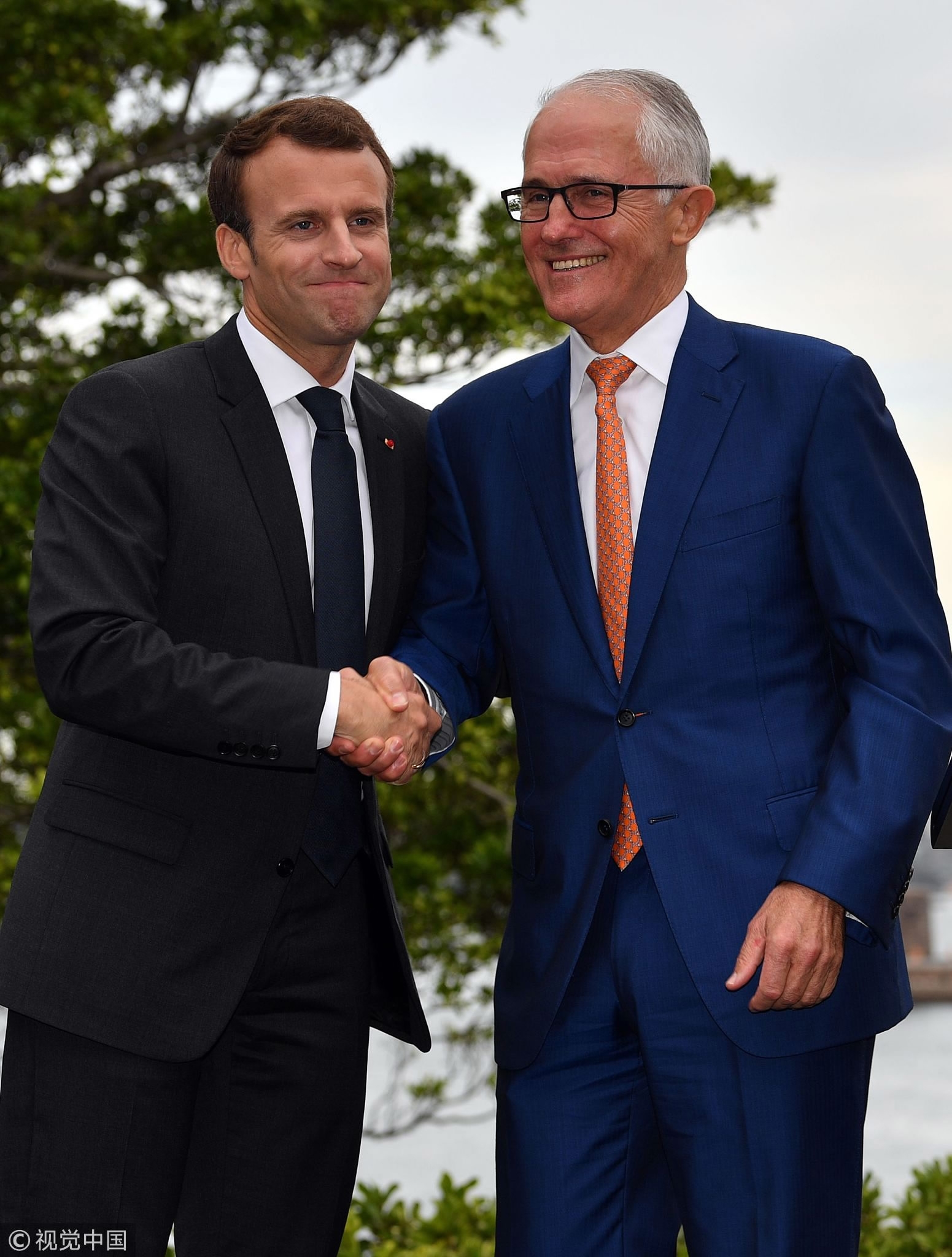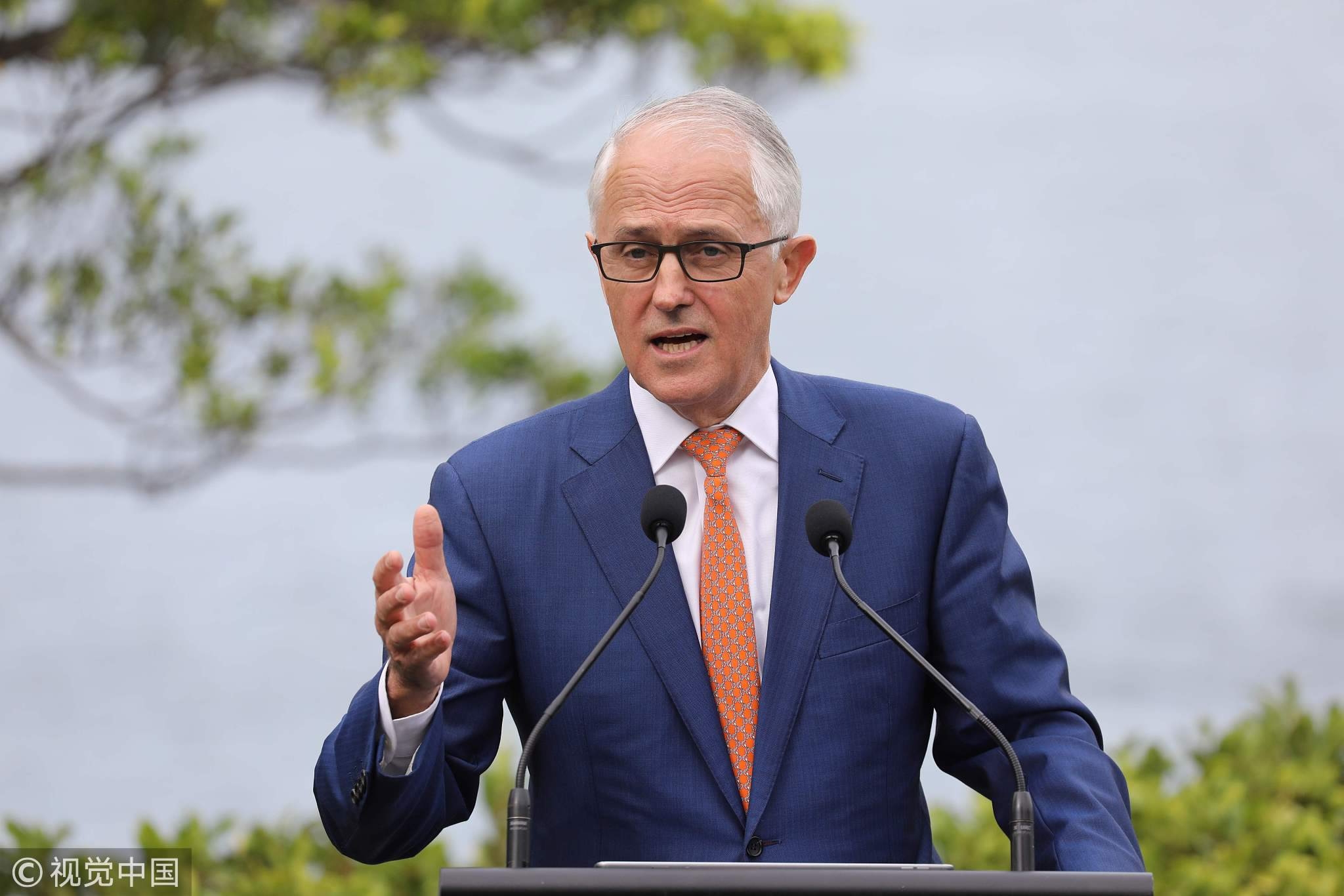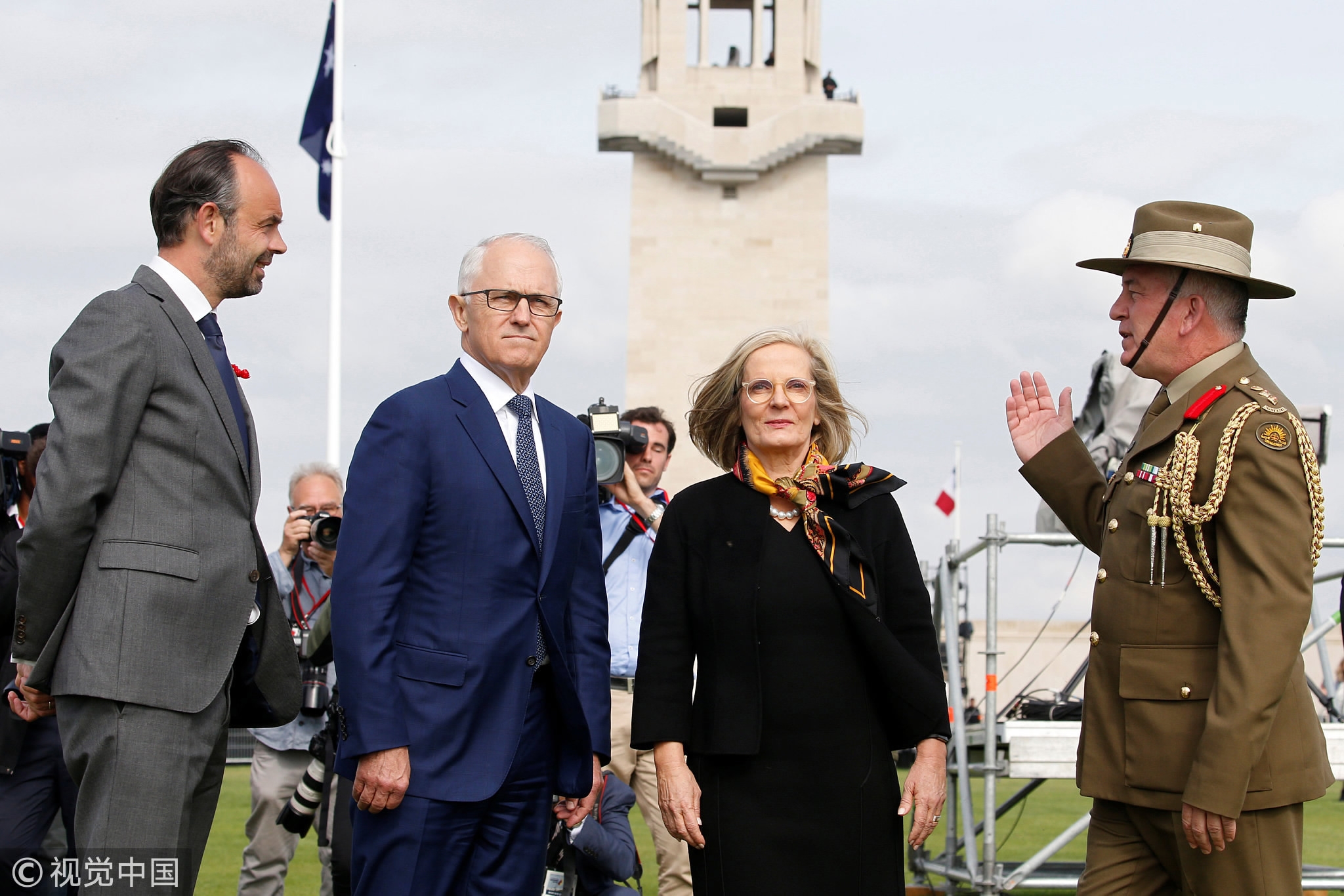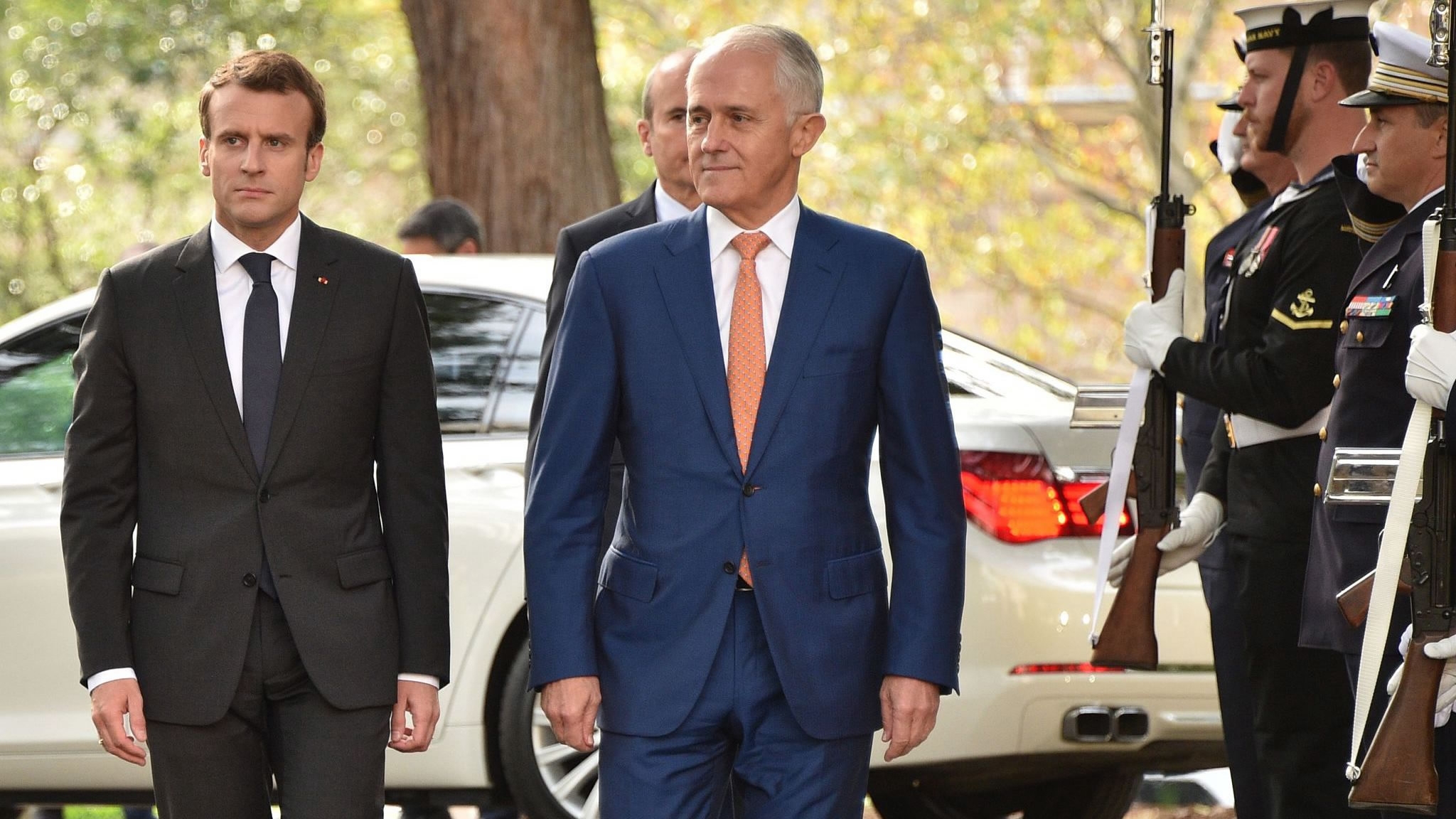As French President Emmanuel Macron winds up his state visit to Australia, he leaves in his wake much to unpack.
Mr. Macron and his Australian counterpart Prime Minister Malcolm Turnbull signed various bilateral agreements, including those aimed at strengthening military ties as well as working together to combat cyber security threats.
But underlying these formalities was the specter of security in the Pacific; the subtext being how to mitigate China’s growing regional influence as the traditional order continues to be eroded.
Mr. Macron noted that Australia and France could be at the center of a new “Indo-Pacific axis” – a term that is rejected by China as a replacement for “Asia-Pacific,” with the specific aim of containment.
Despite assurances from Mr. Macron that any deals made during his trip were not aimed at neutralizing China's rise, the reaffirmation of allegiances to Western Liberal Democracy are having a newfound resurgence.
Talks built upon the Joint Statement of Enhanced Strategic Partnership between the two countries have acknowledged a shared history, values and aspirations in calling for closer bilateral relations.

French President Emmanuel Macron shakes hand with Australian Prime Minister Malcolm Turnbull (R) at the end of a joint press conference in Sydney on May 2, 2018. / VCG Photo
French President Emmanuel Macron shakes hand with Australian Prime Minister Malcolm Turnbull (R) at the end of a joint press conference in Sydney on May 2, 2018. / VCG Photo
Another area which was further fleshed out was the 50-billion-Australian-dollar deal to build 12 new submarines in Adelaide; a deal France’s Naval Group won the contract for in 2016.
Travelling with the French delegation were military personnel and naval contractors.
Also high on the agenda was an acknowledgment of the need to quickly settle a free trade agreement with the European Union; an area that France has so far dragged its feet on.
The looming Brexit has put this into sharp focus, and though the European Union Parliament has ticked off on allowing negations to begin, member-states have yet to agree on a mandate.
The EU is Australia’s second largest trading partner, accounting for 99.5 billion Australian dollars in trade.
But the trip didn’t all go smoothly.
Mr. Macron called on Australia to do more to combat climate change, telling Mr. Turnbull to have “power of conviction” on the issue.
This is an especially pointed comment given Mr. Turnbull’s complicated history on the matter.
In 2009, he was deposed as Opposition Leader by Tony Abbott, in part, for his support of the then Labor government’s plans for an Emissions Trading Scheme (ETS).
Mr. Turnbull is known to be a strong believer in the science underpinning climate change, but has long been white-anted by the right-fringe of his own party in enacting meaningful policy in this regard.

Australia's Prime Minister Malcolm Turnbull takes part in a joint press conference with France's President Emmanuel Macron (not pictured) at Kirribilli House in Sydney on May 2, 2018./ VCG Photo
Australia's Prime Minister Malcolm Turnbull takes part in a joint press conference with France's President Emmanuel Macron (not pictured) at Kirribilli House in Sydney on May 2, 2018./ VCG Photo
The French delegation also questioned why the Victorian State Government was left off the invite list to the signing of a memorandum of understanding (MOU) between French renewable energy giant Neoen and Australian company Zen Energy.
The Victorian Government has long supported Neoen, which has included awarding it the tender to supply clean energy to the state’s tram network.
The snub is being interpreted locally as letting partisan politics get in the way of an important foreign investment deal.
Finally, while laughed off as a moment of lost in translation, Mr. Macron also referred to Mr. Turnbull’s wife Lucy as “delicious” during a speech in Sydney, resulting in confused murmurs by those in attendance.
The visit to Australia comes on the heels of Mr. Macron’s trip to Washington, in which he openly rebuked many of President Trump’s core positions from the lectern in Congress.
This is in contrast to other world leaders who have left airing their feelings of dismay at the administration’s direction to private meetings or conversations on the golf course.
Australian and French leaders previously met as early as last week in the village of Villers-Bretonneux, when Mr. Turnbull and French Prime Minister Edouard Philippe jointly opened the Sir John Monash Center as a memorial to fallen Australian soldiers who served in WWI.

April 24, 2018: French Prime Minister Edouard Philippe (L), Australian Prime Minister Malcolm Turnbull and his wife Lucy Turnbull at the military cemetery before they visit the Sir John Monash Center on the eve of ANZAC (Australian and New Zealand Army Corps) day ceremonies in Villiers-Bretonneux, France./ VCG Photo
April 24, 2018: French Prime Minister Edouard Philippe (L), Australian Prime Minister Malcolm Turnbull and his wife Lucy Turnbull at the military cemetery before they visit the Sir John Monash Center on the eve of ANZAC (Australian and New Zealand Army Corps) day ceremonies in Villiers-Bretonneux, France./ VCG Photo
Mr. Phillipe delivered what was regarded as a beautiful and poignant speech in which he recited a line from "All Quiet on the Western Front": “He is entirely alone now with his little life of 19 years, and cries because it leaves him.”
However, French and Australian relations have not always been so rosy.
It's not necessary to look far back to remember the 1985 sinking of Greenpeace ship Rainbow Warrior at the Port of Auckland in New Zealand in response to continuing protest of France’s nuclear testing.
Or, when Australia recalled its ambassador and defense personnel from Paris, and adopted the policy of no new uranium contracts being negotiated in response to France’s resumption of nuclear testing in the South Pacific in 1995.
Also surprising is that Mr. Macron is only the second French leader to visit Australia after Francois Hollande attended the G20 in 2014.
Before he returns to the Palais de l’Élysée, Mr. Macron will travel to New Caledonia – a colony which will hold a referendum this year to decide on becoming a republic.
For now, though, it remains to be seen whether this visit will lay the groundwork for lasting and meaningful relations between the two nations, or whether plus ça change, plus c'est la même chose.
(Jordan Heng-Contaxis is a fellow at the Asian Strategy and Leadership Institute and Center for Public Policy Studies. The article reflects the author's opinion, and not necessarily the views of CGTN.)





